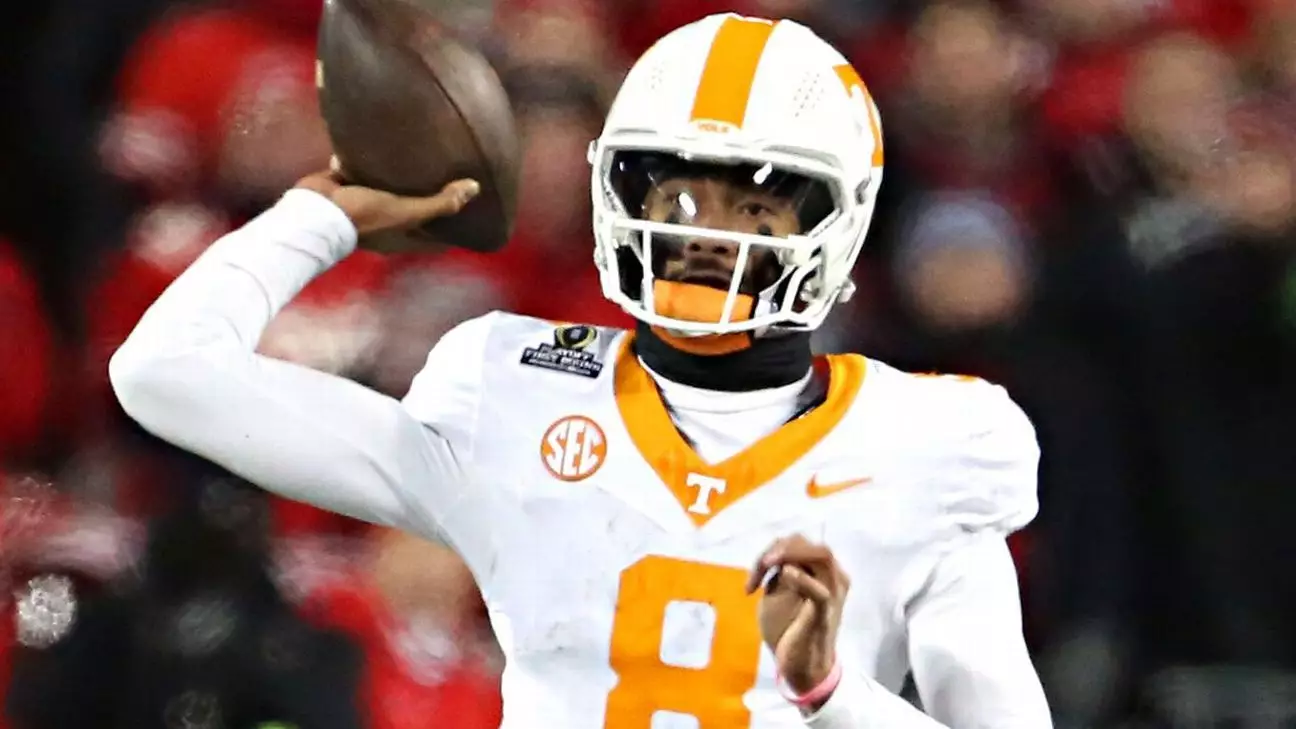In the ever-evolving landscape of college football, the transfer portal has become a double-edged sword—a lifeline for frustrated players and a battleground for coaches navigating their programs’ futures. The potential transfer of Nico Iamaleava from Tennessee to UCLA encapsulates this intrigue perfectly. Iamaleava, a standout talent whose previous commitment to Tennessee generated considerable excitement, is now at the center of a power play that could shift the balance of power within Pac-12 football. As a fan and observer, I cannot help but marvel at the strategic maneuvers both UCLA and Iamaleava are undertaking, which highlight not just athletic capabilities, but also the complex dynamics of modern college athletics.
A High-Stakes Game of Negotiation
The reports indicate that UCLA is favorably positioned in their pursuit of the prodigious quarterback. However, the financial aspects of the deal remain shrouded in uncertainty, with Iamaleava reportedly seeking a staggering $4 million. This raises critical questions about the real motivations at play. While the pursuit of a high-caliber player should be grounded in achieving athletic excellence, the fact that a college student-athlete is now negotiating deals worth millions underscores how commercialized college sports have become. Are we genuinely interested in nurturing talent for the sport, or is it all about the bottom line? As someone who advocates for college athletes’ rights to fair compensation, I find myself torn. Iamaleava’s pursuit of financial security is understandable; however, it highlights the troubling precedent of prioritizing cash over camaraderie and loyalty to university colors.
The Coaches’ Dilemma
Coach DeShaun Foster, fresh off a challenging debut season that saw UCLA struggle to gain traction, faces a watershed moment with the potential onboarding of Iamaleava. The recruitment of such a highly regarded quarterback could either solidify Foster’s position or throw him into further scrutiny if things don’t unfold as planned. The prospect of Iamaleava stepping into the role, especially after a season in which the Bruins finished low in numerous offensive rankings, presents both promise and peril. From Foster’s perspective, welcoming an established talent could lead to an immediate turnaround, but the underlying pressure from fans and administration to produce results fast only thickens the atmosphere of uncertainty.
The Complexity of Player Loyalty
Iamaleava’s journey sheds light on another intricate facet of college football: loyalty to one’s team. The abrupt shift from Tennessee—where he was once considered a cornerstone recruit—suggests a fracture in the traditional narrative of team spirit. Coach Josh Heupel’s statement about the “Power T” being bigger than any one player speaks volumes about the ideological divide between institutional loyalty and individual ambition. Yet, as we watch Iamaleava potentially re-commit to a program where familiarity exists, it forces us to ponder the often-contradictory nature of these relationships. In an era where athletes are empowered to chase better opportunities, should we view their choices for greener pastures as betrayals, or as natural evolutions dictated by their aspirations and financial realities?
The Fan Perspective: An Emotional Roller Coaster
For fans, the yo-yoing emotions tied to player decisions and transfer announcements are dizzying. One minute, the narrative celebrates a player’s commendable performance while steadfastly representing their school; the next, the same player is weighing options that could lead them somewhere else entirely. This emotional investment complicates the nature of fandom itself, replacing unconditional support with transactional alliances. Iamaleava’s flashy statistics from last season—2,616 yards passing, 19 touchdowns—would undeniably set the field afire at UCLA and bring back long-lost excitement for the program. Yet, the backdrop of finance and personal ambition begs the question: how much of our fandom is driven by passion for the team, and how much is simply a connection to the star players of the moment?
The undercurrents of the unfolding drama surrounding Iamaleava reveal a microcosm of the broader challenges facing college athletics today. From financial negotiations dictating player movement to the shifting allegiances of players and fans alike, it is clear that both the sport and its stakeholders are grappling with rapidly evolving expectations and values.


Leave a Reply